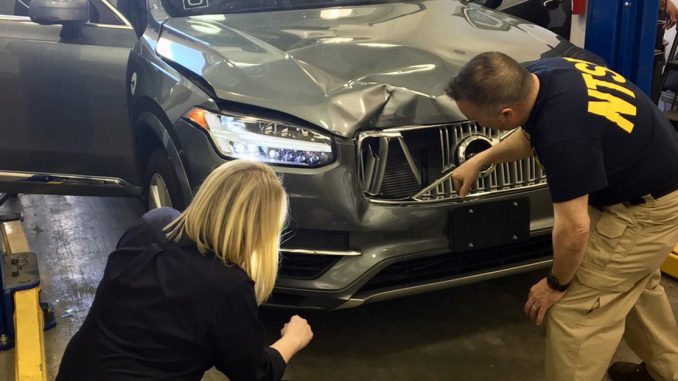
TEMPE, Ariz./SAN FRANCISCO — A woman crossing a street was killed by an Uber self-driving sport utility vehicle in Arizona, police said on Monday, prompting the ride services company to suspend its autonomous vehicle program.
The accident in the Phoenix suburb of Tempe dealt a potential blow not only to Uber’s strategy but the eventual rollout of robot cars on public roads.
It was the first fatality from a self-driving vehicle, which are being tested around the globe in a high-profile race by global automakers and tech companies expecting that autonomous vehicles will transform transportation and the ride services business.
The vehicle was in autonomous mode with an operator behind the wheel at the time of the accident, which occurred overnight Sunday to Monday, Tempe police said.

“The vehicle was traveling northbound … when a female walking outside of the crosswalk crossed the road from west to east when she was struck by the Uber vehicle,” police said in a statement.
Police identified the victim as Elaine Herzberg, 49. Herzberg later died from her injuries in a hospital, police said.
Local television footage of the scene showed a crumpled bike and a Volvo XC90 SUV with a smashed-in front.
Tempe is 11 miles east of Phoenix.
An Uber spokesman said the company was suspending North American tests of its self-driving vehicles. In a tweet, Uber expressed its condolences and said the San Francisco-based company was fully cooperating with authorities.
Volvo confirmed the vehicle was a Volvo XC90, which Uber has been using special versions of in its testing. Russell Datz, a spokesman for the automaker, said the autonomous technology was not made by Volvo.
The U.S. National Highway Traffic Safety Administration (NHTSA) and National Transportation Safety Board (NTSB) said they were sending teams to investigate the crash. NHTSA also said it was in contact with Volvo.
Senator John Thune (R-S.D.), who heads the Senate Commerce Committee, and has been urging Congress to pass legislation encouraging study of putting self-driving cars to U.S. roads, said in a statement the accident “underscores the need to adopt laws and policies tailored for self-driving vehicles.”
“Congress should act to update rules, direct manufacturers to address safety requirements, and enhance the technical expertise of regulators,” Thune said.
Arizona has opened its arms to companies testing self-driving vehicles as a means to economic growth and jobs. Gov. Doug Ducey signed an executive order in 2015 allowing for the testing of such vehicles on Arizona streets and reached out to Uber a year later after California regulators cracked down on the company over its failure to obtain testing permits.
Uber is one of many technology companies and automakers, including Waymo and General Motors’ Cruise division, racing to ready self-driving cars for public use in coming years.
Uber has said its ability to build autonomous cars is essential to its success in the rapidly changing transportation industry. The company envisions a network of autonomous cars that would be summoned through the Uber app that would supplement — and eventually replace — human-driven cars.
Before the accident, Uber had more than 100 autonomous cars testing on the roads in Phoenix, often with human drivers in them in case of a crisis.
